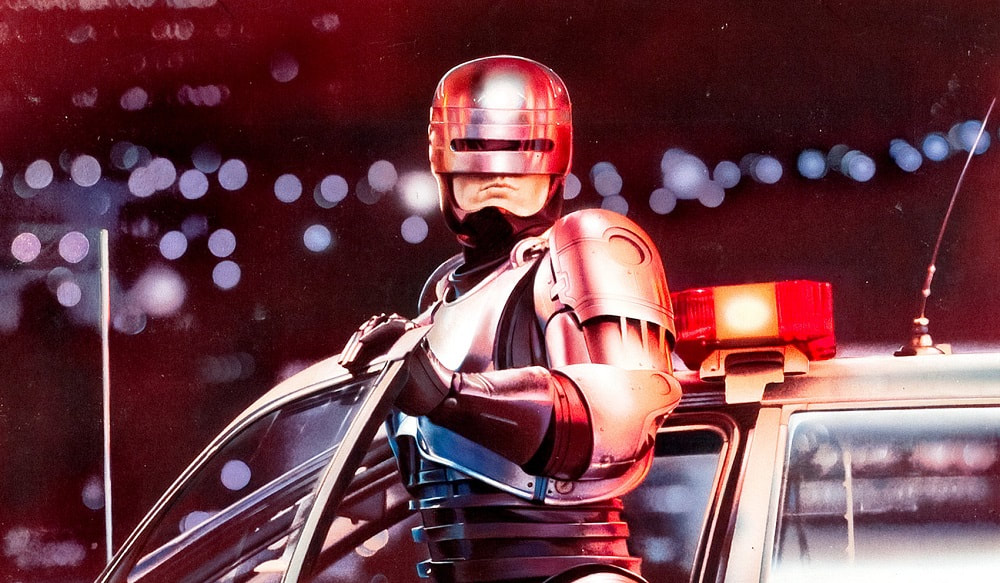|
An Action Canon is a new series focusing on the action movies that, for me, represent the best and most important entries in the genre. Each entry will look at what makes the film special, and how it fits into the overall history of action movies.
In a dystopian near future Detroit, police officer Alex Murphy is murdered and subsequently resurrected as a sophisticated law enforcement cyborg. RoboCop is expected to clear the way for the demolition of the crime-ridden, impoverished Old Detroit so that the gleaming Delta City can be built in its place. Instead, Murphy takes on the two corrupt entities that run the city and which share a symbiotic relationship - the vicious street gang that killed him, and the ruthless corporation which remade him.
A controversial Dutch director whose only previous English-language production had been a major flop; a script by two men with no prior experience of screenplays; and a star who had appeared only in a string of obscure, mostly unsuccessful movies. These are not the expected ingredients of a major hit in Hollywood, much less a film with a lasting impact on pop culture - yet that was what RoboCop became following its release in the summer of 1987.
Today, RoboCop deservedly ranks as one of the most important and best action movies of the decade. In an era marked by superb sci-fi action blockbusters like The Terminator (1984) Aliens (1986), and Predator (1987), the film more than holds its own. This is in large part due to the perfect combination of the startlingly aggressive style of Paul Verhoeven with the sledgehammer satire of the script by Ed Neumeier and Michael Miner.
RoboCop has a crucial place in action movie history not only because of its financial success and lasting cultural impact. It also helped to prove that the action film could be a vehicle for the delivery of intriguing ideas, even at the same time as providing the expected popcorn thrills. RoboCop has the disreputable tone, low-brow sci-fi aesthetics and “reprehensible” violence that critics use to deride action movies, but over the years even they have had to grudgingly afford it masterpiece status. This is testament to Verhoeven’s achievement.
This is a film that has an enduring power to shock, not only due to its violence but also because of the sheer intensity of its approach. Easily one of the most extreme mainstream movies of the 1980s, RoboCop is on the attack from its very beginning and seldom lets up across its brisk 102-minute runtime. With its “News Break” segments, the movie introduces its scathing satire on every aspect of Reagan’s America, from privatisation and corporate greed to the incessant dumbing down of pop culture. This continues into the film itself, with the unholy alliance between corporate suits and vicious gangsters - really just two different kinds of criminal, joined at the hip - which collude to turn Alex Murphy into “the future of law enforcement”.
Verhoeven was new to Hollywood, but already an experienced director by 1987 and his approach exudes confidence throughout. While the film is uncompromisingly aggressive and explicit in many ways, it also knows when to show restraint. The introduction of the RoboCop suit is a case in point - Verhoeven carefully shows Robo on a small lab monitor, and then through frosted glass, before the eventual big reveal. While analyses of RoboCop typically focus on the film’s excellent special effects, performances and satire, it is also crucial to appreciate how humane the film is. It may be brutal and lurid, but RoboCop is ultimately about what survives, what endures, when an attempt is made to turn a person into a machine. The film is as much about the human soul as it is about exploding robots and slimy executives on the warpath. The film is packed with memorable action scenes, such as a spectacular exploding gas station and a gloriously bloody shootout in a drug lab, but the scenes which expose its emotional core are equally indelible. When RoboCop visits the house where Murphy used to live, now on sale after his wife and son moved away believing him to be dead, it has an emotional impact that few action movies have ever matched. Similarly, when our steely hero triumphs in the end, it is a cause for celebration like few other scenes in the genre because of the extent to which we identify with and care about Murphy. Buoyed by the success of his first true American film, Verhoeven would go onto a fascinating career in Hollywood. Notably, he would return to the combination of sci-fi and action on two subsequent occasions, first with Total Recall (1990) and later with Starship Troopers (1997). Both of these would be almost as aggressive as the movie that preceded them, and even more subversive. With the latter film, Verhoeven somehow managed to coax a major American studio to spend $105 million on a project which almost explicitly draws comparisons between the United States and Nazi Germany. Today, the director sometimes called “a one man Dutch film industry” is better known for his impact on American movies. It was RoboCop that allowed Verhoeven to become action cinema’s ultimate outsider in Hollywood - able to inject American movies with a supercharged subversiveness as only an outsider can. By repeating the feat, he helped to shift perceptions of what action movies can be and inspired numerous other subsequent films, not least those of his closest contemporary analogue, Neil Blomkamp. Almost 35 years later, RoboCop remains the gold standard for the fusion of blistering action with scathing satire and one of the best and most memorable films of its era. I’d buy that for a dollar.
0 Comments
Your comment will be posted after it is approved.
Leave a Reply. |
About
Exploring classic science fiction, with a focus on the 1950s to the 1990s. Also contributing to Entertainium, where I regularly review new games. Categories
All
|

